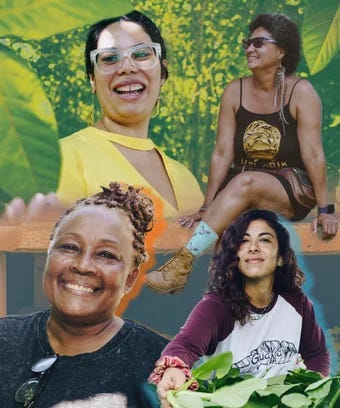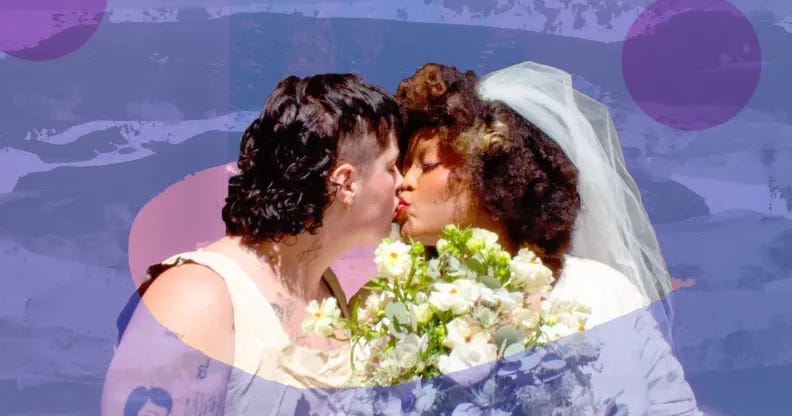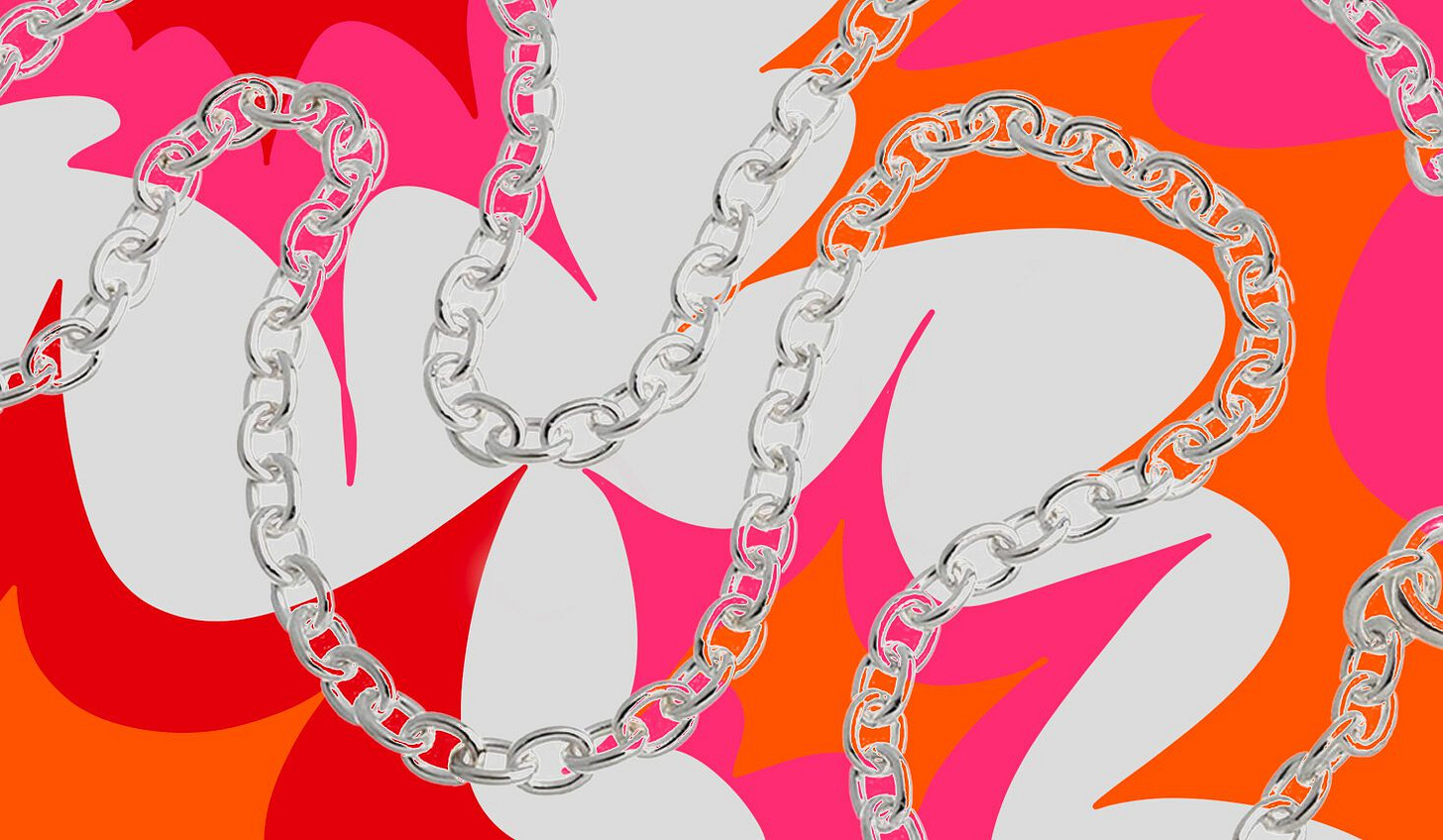Global Roundup: Libya Women in Flood Aftermath, Puerto Rico Women Environmentalists, Chinese Women Defy ‘Beauty Duty’, TikTok Queer Trans Couple, Embracing the Words ‘Butch Lesbian’
Curated by FG Contributor Samiha Hossain
A survivor looks at the rubble of destroyed buildings following deadly flash floods in Libya's Derna, 18 September 2023 (AFP)
Experts are warning that women who survived flooding caused by Storm Daniel in Libya have been left without proper care despite aid efforts. The disaster last month killed more than 4,000 people and left over 10,000 missing. And now, women are struggling to get access to hygiene, sanitation and menstrual products.
Hajar Darwish, a Libyan women’s sexual health specialist living in the UK, notes that men are often making the decisions and thus do not consider women’s needs. She adds that there could be severe consequences for pregnant women if infections spread, which is likely when clean hygiene facilities are lacking.
I have also noticed that organisations don't consider appropriate clothing when it comes to women, for example women need specific underwear such as bras especially if they're pregnant and there’s no point in giving out menstrual pads if they have no underwear to stick it to. -Hajar Darwish
Heba Shaheed, a women’s pelvic health and wellbeing expert, also believes that women are often an “afterthought” in natural disaster crises. Shaheed says that women’s needs are only considered after food, blankets and shelter, meaning that when it comes to delivering aid to women, it is often forgotten that they have additional needs
There are a lot of organisations that now do consider women's needs but it's still not the first thing on their minds, it's thought of later. This is something that needs to be improved, especially as it is something that women won't speak out about, especially in a natural disaster. -Heba Shaheed
Darwish also brings up that often in the aftermath of a natural disaster, women experience shame as a result of not being able to address their basic needs. Accessing period products in Libya is already associated with shame as the products are never on display, she says. Darwish advocates for aid organizations and charities including affected women in discussions on what their needs are.
Refinery29 highlights several women who are cultivating and nurturing innovative projects that address environmental and climate injustices throughout Puerto Rico, as part of an oral history and photo essay project – two of the women will be covered here. Access to capital is one of the main challenges for women leading environmental justice initiatives around the world. In the U.S., white-led organizations are often the ones receiving funding. There is also a layer of bureaucracy that prevents community organizations from getting proper business permits. Community-based groups in Puerto Rico denounce the lack of government support in post-disaster recovery.
Ada Ramona Miranda grew up in Aguirre, a neighborhood in the southern municipality of Salinas. Today, the school and theater have closed. Many houses sit abandoned. And a huge decaying iron structure remains, a reminder of the inequities that Puerto Rico’s sugar production past brought.
Ada has decided to learn practices to promote health, including agroecology, renewable energy, and regenerative tourism, which seeks to nurture a destination instead of extracting resources from it. She is putting all her learnings into practice with her own project in Adjuntas: Hacienda Las Malcriá.
The independent legislator from the municipality of Salinas offers workshops and grows coffee trees. She invested in a property for her organization, but to make the purchase possible, she had to take on other jobs and dedicate less time to farming. Ada wants Hacienda Las Macriá to be a space where women can connect with nature and with their own self-worth. Malcría, which comes from the Spanish word “malcriada,” directly translates to “badly raised.
We are coming out of being poorly raised… of being poorly raised by the patriarchy. -Ada Ramona Miranda
Vanessa Uriarte is the codirector of Amigxs del M.A.R., an organization that fights to protect Puerto Rico’s ecosystems and communities through education and advocacy. It played an integral part in protecting the five acres of land that builders deforested in 2005 to build a hotel, pools, and an underground parking lot. In response, Amigxs del M.A.R., along with other activists and organizations, kicked off a 14-year civil disobedience campaign, camping on site to obstruct construction.
And we sowed this coastal forest and [restored] all of this ecosystem as a counterproposal of how our beaches should look to [not only] defend ourselves from climate change but also so we can see that there are other alternatives. -Vanessa Uriarte
Communities in Puerto Rico are fighting to defend overdevelopment seaside. There are several beaches in Puerto Rico that, for all practical purposes, businesses have privatized, contrary to the archipelago’s law that all beaches are public spaces. Amigxs del M.A.R. is advocating for a law that would enact a construction moratorium on Puerto Rico’s coast.
Legend Zhu was the conventional ideal of Chinese beauty and led her university’s modeling team. Over the summer, she took to Xiaohongshu (a Chinese social media platform known for its lifestyle influencers) to post a selfie with buzz-cut hair and a cosmetic-free face. “From a model to a natural woman,” Zhu wrote in the post, which also included “before” images from her modeling days. Zhu’s image received more than 1,000 likes and she was applauded for her defiance of the pressure on women to conform to traditional beauty standards.
Zhu, 23, is among a number of young women inspired by a growing trend of rejecting what is known in Chinese internet parlance as “beauty duty”: the costly and sometimes painful devotion to mainstream notions of attractiveness. The idea is to spend time and resources not on beauty standards, but on personal development, including education and career growth.
To stay beautiful, you need to constantly invest time, money and energy. Most men are free of this. It is unfair. -Legend Zhu
Women subscribing to this idea are also refusing to starve themselves, shunning the dangerous diet culture that has underpinned popular internet challenges, such as one involving a piece of A4 paper held vertically at the user’s midsection to try to obscure the waist. When Annie Xie, a woman in the northern city of Qinhuangdao, was in middle school, she began wearing makeup and colored contact lenses and dieted to fit into size 0 dresses. At 15, she was hospitalized for anorexia nervosa. That was when she started to look inward and was inspired by a classic of feminism, “The Second Sex” by Simone de Beauvoir. Reading its famous sentence “One is not born, but becomes a woman,” she said, felt “like a lightning strike.”
Zelda Liu, a 27-year-old woman from the southeastern city of Suzhou, said that when she decided to get a buzz cut, she had to do it herself. Hairdressers hesitated, worrying that the close shave would hurt her scalp — a notion she found absurd: “Are female heads not heads?” More than a year later, she is still sporting the cut and says it has meant she no longer gets unsolicited male attention or suggestions that she put on makeup. She describes the newfound freedom as a sense of “flying high.”
With the ongoing crackdown on feminism in China, women making feminist statements online often face abuse and sometimes have their social media accounts deleted for “gender discrimination.” Those who have complained about sexual mistreatment by powerful men have lost in court or been pressured into silence. Still, women in China persist and are finding meaningful ways to resist the patriarchy.
Queer, trans couple Grey and Grayson Prince. Instagram/graysonprnce
A queer trans couple is challenging what modern love looks like, one TikTok video at a time. Couple Grey and Grayson Prince are sharing “gay, funny and weird” videos on their TikTok page “officiallyverygay” to challenge stereotypical notions of what queer, trans love looks like.
The page ranges from vulnerable snippets of Grey crafting a fierce look while experiencing dysphoria to a clip where Grayson opens up about how getting top surgery ranks among the “best days” of their life. There are also plenty of wholesome, cute videos of the pair deeply in love with each other.
Grey and Grayson share that their TikTok has become a “bit of a time capsule” of their time together and how deeply impactful it has been for others to see a couple that challenges the cisgender, heteronormative narrative of relationships.
I think it was really important to see. I loved watching couples when they first started going on TikTok, especially queer couples, interracial couples, plus-sized couples, couples of differing religious backgrounds. I don’t think we realised immediately, but people were like, ‘This is a twisted Americana romance. I don’t understand. You’re Afro-Indigenous. He’s an ex-Mormon.’ -Grey
When they started documenting their relationship online three years ago, Grayson says there weren’t many TikTok couples around at the time, and there was certainly a lack of queer couples that looked like them on the platform. So they were focused on their joy instead of “necessarily trying to follow an archetype or anything”.
Their 2022 wedding videos, which featured everything from their vows to the outfits they chose to wear at the ceremony, are among their most popular TikToks. But they were almost among the videos that attracted the most hate. Despite the negativity, they know they’re treating their account like they did when they first started because they just “want to be gay, funny and weird”.
It feels like we’re doing something for the greater good, or just helping people get through their day by knowing that they could have something beautiful too or they already have it and need to appreciate it. -Grey
DESIGN BY ANISA CLEAVER
To mark International Lesbian Day on October 8th, Ella Braidwood reflects on her journey towards accepting and celebrating her identity. When Braidwood first came out, she used the word “gay” instead of “lesbian” or “butch” as she felt it had less stigma attached to it.
As LGBTQIA+ people, we absorb the meanings of words, not only from their literal definitions, but also from the way they’re used around us. For many of us, that also means absorbing the shame attached to the language that comes our way. -Ella Braidwood
Braidwood discusses how deep down, she loved the idea of being butch. Eventually, she realized she couldn’t live her whole life trying to make other people comfortable so she slowly started making changes such as buying men’s clothes and getting a short haircut. She also mentions the difficulty of identifying with a word that is weaponized against trans people. It has been important for Braidwood to reclaim this word and though she calls shame “persistent,” she continues to work toward embracing her true self.
I’ll be proudly holding another woman’s hand in east London, only for a boy on a bike to shout at us: “Lesbians! Do you want a threesome or something?”...Then, on better days – which, to be fair, is most of them by now – I’ll beam into the mirror, with my hands in the pockets of my jeans. Because I know how long it took me to get this far. Connell chain on. Hair slicked back. Checked shirt and DIY ready. -Ella Braidwood
Samiha Hossain (she/her) is an aspiring urban planner studying at Toronto Metropolitan University. Throughout the years, she has worked in nonprofits with survivors of sexual violence and youth. Samiha firmly believes in the power of connecting with people and listening to their stories to create solidarity and heal as a community. She loves learning about the diverse forms of feminist resistance around the world.






